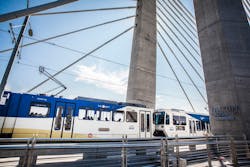TriMet reallocates $1.8 million in funding from transit police and additional sources to community-based services that preserve public safety
In the wake of nationwide protests against police brutality, TriMet is joining the community in taking action.
TriMet says transit plays a critical social equity role, providing access to jobs as well as mobility for those who can’t afford to own a car and people with disabilities that prevent them from driving. Studies suggest that access to high quality transit is an important factor in addressing generational poverty. Good public transit is arguably the most important tool in the effort to combat climate change, which disproportionately affects people of color and low-income communities. However, to be successful in serving those ends, transit must be safe and equitable for all.
To help fulfill that promise, TriMet is undertaking a series of immediate short-term actions and pursuing long-term considerations as part of this year’s budget process. Moving forward, TriMet will reduce existing police contracts by six positions and redirect additional funds totaling $1.8 million to community-based public safety approaches.
Piloting community-based public safety approaches
For the next fiscal year starting July 1, TriMet will initiate three efforts to inform a reimagined public safety approach:
- Conduct community-wide listening sessions to gather feedback from riders, front-line employees and community members on the best approaches to providing security on the transit system that is free from bias.
- Establish a panel of local and national experts to advise TriMet on national best practices for transit security, equity and community engagement in safety and security.
- Pilot new non-police response resources, such as mobile crisis intervention teams for mental and behavioral health issues.
TriMet says it knows security matters to riders and will retain Transit Police officers on the system as they play a vital role in preventing crimes against riders and employees, while also responding if a serious incident does occur. Having officers dedicated to transit allows them to become familiar with TriMet staff, how the system works and the needs of riders. Officers can provide riders and employees assistance in addition to security. However, TriMet says it recognizes not all situations that happen on the transit system and in the communities it serves require a police response. That is why the agency wants to pilot alternative approaches to public safety on transit, such as the mobile response crisis programs and other unarmed alternatives.
Reimaging public safety on transit
TriMet says it wants to ensure people of all races, religions, cultures and gender feel supported on the system. To do so, TriMet wants to engage riders, partners, community-based experts and the public. Within the next 90 days, the agency will plan several community listening sessions, hosted by community-based facilitators. It will also conduct internal and external surveys with riders and front-line employees and engage transit police officers and contract security staff.
“This is an important continuation of TriMet’s efforts to ensure the safety and equity of our system,” said TriMet General Manager Doug Kelsey. “As we develop our plans for reinforcing a transit system that is equitable and fair to all, we need input from our riders, our front-line employees, the community, mental health experts and others who work closely with people who are houseless or struggling with addiction. We’re asking all of you to help us reimagine public safety on transit.”
TriMet says it appreciates Portland Mayor Ted Wheeler’s support for the continuation of the city of Portland’s participation in the Transit Police Division through Dec. 31, 2020, to allow time for a thorough community conversation and thoughtful transition process. TriMet thanks everyone for their patience as this process will take some time to make sure it identifies proven and effective strategies that will make the transit system better not just for today but for the future.
Equity steps TriMet has taken
The new actions TriMet is announcing today join the steps and actions the agency has taken over the past five years, in coordination with the Transit Equity Advisory Committee, to make the transit system fair and equitable:
- Initiated two independent analyses (in 2016 and in 2018) of the fare citation process that found no systemic racial bias.
- Decriminalized fare enforcement by soliciting in 2017 a change in state law to allow TriMet to resolve fare evasion citations directly rather than citations automatically going to the court.
- Reduced the punitive impacts of fare evasion penalties in July 2018 with potential for reduced fines, community service or enrollment in TriMet’s Honored Citizen reduced fare program.
- Implemented a low-income fare program in 2018 that has allowed more than 30,000 people to ride with Honored Citizen reduced fare, a 72 percent discount over TriMet’s base fare.
- Changed TriMet Code as of December 2018 to clarify that fare evasion only is not a crime and have discontinued routine fare checks by police.
- Increased unarmed security personnel beginning in 2017 in response to community concerns over militarized security presence.
- Worked with regional district attorneys in December 2016 to dramatically reduce the use of Interfering with Public Transportation (IPT) charges.
- Implemented additional training in spring 2019 for contract security staff and fare inspectors related to community safety practices, de-escalation and non-confrontational interactions.
Moving forward timeline
TriMet has made some changes but says it knows riders and the community want and deserve more. That’s why TriMet says it will initiate these actions:
- Reallocate funding from police services to community-based public safety opportunities prior to July 1, 2020.
- Conduct community listening sessions and outreach over the next 90 days.
- Immediately form a blue-ribbon committee made up of safety, security and equity experts. The committee will report to the Board before the expiration of the current police management intergovernmental agreement this winter, to review TriMet action plans and advise further opportunities.
TriMet says it remains dedicated to providing safe and secure transit for riders and employees. While TriMet is reducing the number of police officers that make up the Transit Police Division, TriMet will continue to have dedicated security personnel conducting patrols on the system while it pursues additional community-based public safety teams.


